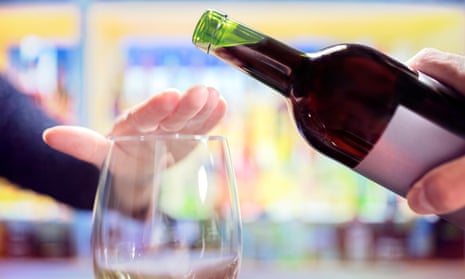The dilemma I am a 50-something mum of teens, with a busy job and the menopause. My drinking has increased over the last five years – only in the evening, and it has never impacted work or family, but it peaked at a bottle of wine five out of seven nights a week. My husband joined me.
I realised that I am an alcoholic. I asked my husband not to drink in the house for a while, or to wait until after I was in bed. But he won’t stop on the basis I am the problem drinker and not him. He says I am being a control freak and setting out unacceptable rules. Recently, he persuaded me to have a glass of wine; I drank a bottle and had the worst hangover the following day. Tonight, my husband asked me to bring home a couple of bottles of wine, but I refused. I asked if he could refrain and to support me. He went off on one again about me trying to control him and that if I can’t cope with him drinking then I really need to get some help.
It’s really upsetting me. I want to stop drinking. I don’t think it’s unreasonable to ask my husband to support me in the short term. But not only does he not recognise that I have a problem; he is also anything but supportive.
Mariella replies He is in denial. Thankfully, you are not. The daily glass of wine (or more) to defuse the dealings of the day can be a slippery slope, as many of us who’ve stumbled our way through the menopause know. That blurring of the edges of existence becomes all the more appealing as the stresses and strains of normal life (along with the indignities of ageing) reach a crescendo just as our hormone levels go into freefall.
I applaud your Damascene revelation, but unfortunately your clarity isn’t contagious. Your husband’s behaviour suggests he has his own issues with alcohol and that there are problems between the two of you that need to be looked at in greater detail. His declaration that your desire for support is a controlling move is a seemingly dysfunctional conclusion that hints at underlying issues. Delving deeper into that is advisable, as is perhaps some form of counselling before that small kernel of discord becomes an enormous obstacle between you. Let’s park that problem for the moment, though, as I don’t want to overload you.
Your immediate concern should be to cut out the drinking. Addiction is an individual issue and while the help and support of loved ones may make recovery a little easier, it’s a process that you need to face alone.
The first thing any qualified professional will tell you is that you can’t make your liberation from addiction a codependent exercise. Having the wherewithal to realise your drinking is a problem is admirable and the first vital step to a better way of life. Trying to get those around you to change their behaviour before you’ve confronted your own is less likely to bear fruit. There’s no question that your husband’s behaviour is unsupportive and passive-aggressive, but you haven’t elaborated on your relationship so it’s hard for me to fathom what his issue is. I’m sure it’s partly fuelled by the fact he doesn’t want to drink alone, but ask yourself whether your relationship relies on such displacement activity to keep it ticking over.
Long-term relationships often struggle to evolve as each partner matures, and when your downtime is defined by bad habits it can be incredibly hard to change that dynamic. That’s why it’s essential you take responsibility for your own destiny and seek out a community of people committed to the same cause. There’s a reason Alcoholics Anonymous and other groups chose a communal approach and a mentor: only those who’ve been through and conquered addiction can truly understand what it’s like when your favourite tipple is no longer a choice, but an imperative.
In short, relinquishing the hold of your own addiction can’t be dependent on the behaviour of those around you or you’ll never be free. That said, it’s certainly not unreasonable to ask your husband to modify his behaviour in the short-term and if he can’t or won’t then either he has problems of his own, or your relationship is in dire need of an overhaul.
As a woman slightly older than you, I know very well how wine is no longer my friend: it leads to insomnia, late-night bouts of anxiety and an inability to perform at anything like my full capacity the following day. As those are all areas of deterioration in middle age anyway, being dependent on a supposed mood “enhancer” that only causes further depletion of your “assets” is something that’s worth battling to be free of. It’s a tough challenge, but one you can’t afford to turn down.
At the end of the process your life will be richer, healthier and infinitely more productive. That’s the time to think about whether you’re with the right companion for this brand new chapter.
For support and help, go to Alcoholics Anonymous (0800 9177650); for relationship advice go to Relate

Comments (…)
Sign in or create your Guardian account to join the discussion